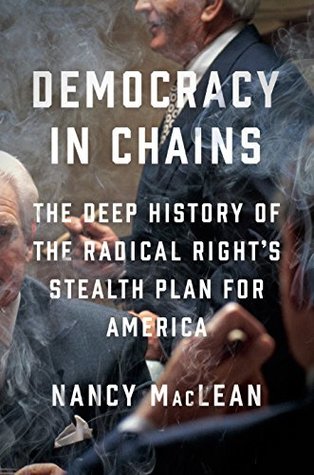More on this book
Community
Kindle Notes & Highlights
Read between
December 14, 2017 - January 7, 2018
Americans have been told for so long, from so many quarters, that political debate can be broken down into conservative versus liberal, pro-market versus pro-government, Republican versus Democrat, that it is hard to recognize that something more confounding is afoot, a shrewd long game blocked from our sight by these stale classifications.
The Republican Party is now in the control of a group of true believers for whom compromise is a dirty word.
“They expected us to raise our incomes without improving education.”
In May 1954, the justices announced their verdict in Brown v. Board of Education. Lost to all but the scholarly literature is the fact that most of Virginia’s white citizens were inclined to accept it. Hardly any liked it, but it was the unanimous decision of the highest court in the land, after all. More than a few knew, too, deep down, that the system had been grossly unfair; seeing the latest ruling as definitive, they took the end of segregation to be beyond their control.
They would ennoble the scorned Confederate cause even if, as their correspondence reveals, it took willful blindness, outright falsification, and the highly strategic demeaning of African Americans to achieve it.
a system that started out with strong protections for property rights became, over time, a system where only property rights were protected.
Busy with other matters, “they devote relatively little time and effort in acquiring information about social policy alternatives”; rather, “they accept what they are told” by news sources they trust. And so it was incumbent on the cause to change what they were hearing and from whom. His vision was to start by converting people of power in domains that mattered: politics, business, the media, and the courts.
Jesus as reported in the Gospel of Luke produced perverse results in the modern world.
In the view of the libertarian economist, Jesus was mistaken.
By this logic, what seemed to be the ethical thing to do—help someone in need—was not, after all, the correct thing to do, because the assistance would encourage the recipient to “exploit” the giver
There was no sense glossing over it anymore: democracy was inimical to economic liberty.
but he valued economic liberty so much more than political freedom that he simply did not care about the invitation to abuse inherent in giving nearly unchecked power to an alliance of capital and the armed forces.
Meanwhile, college tuition costs now equal 40 percent of the average household’s income, making a higher education in Chile the most expensive on the planet, relative to per capita income.
What was needed was a way to amend the Constitution so that public officials would be legally constrained from offering new social programs to the public or engaging in regulation on their behalf even when vast constituencies were demanding them.
The largely African American population of Flint, Michigan, knows firsthand what will happen to “people who fall by the wayside” in the new political economy run by people who think this way.
Is it any surprise, then, that those who would put public sanitation and clean water at risk are now the leading proponents of climate change denial?
That advice was rejected by serious scientists and concerned citizens, so the Cato Institute and the Independent Institute joined a circle of less-known Koch-funded libertarian think tanks driving what two science scholars describe as systematic environmental “misinformation campaigns.”
“We’re looking at a party,” the economist and columnist Paul Krugman rightly points out, “that has turned its back on science at a time when doing so puts the very future of civilization at risk.”


